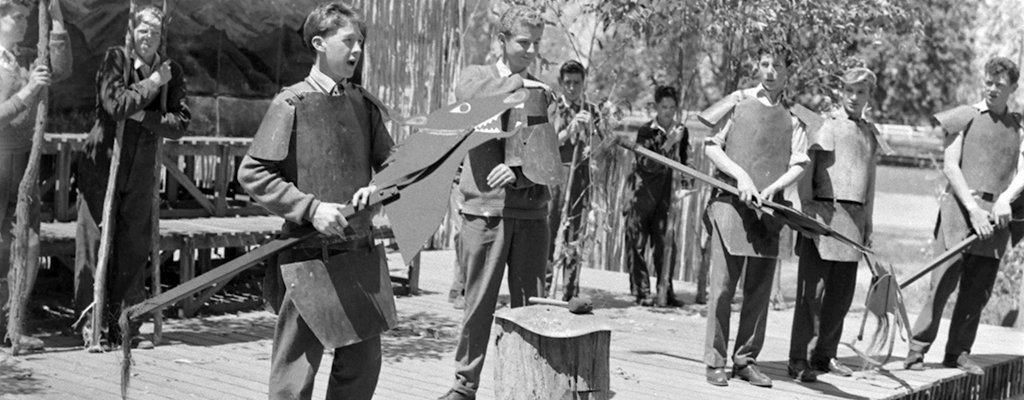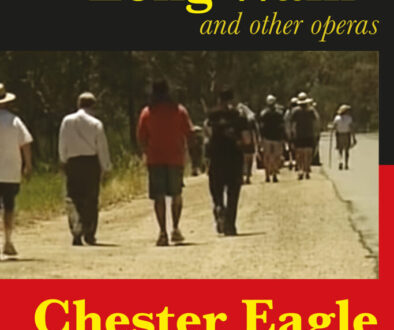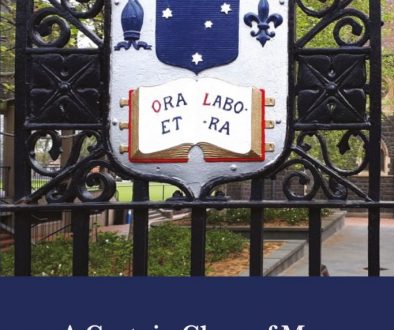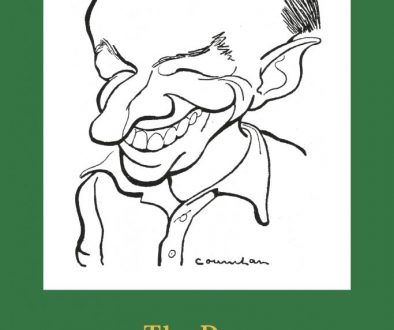The Wars Were Over
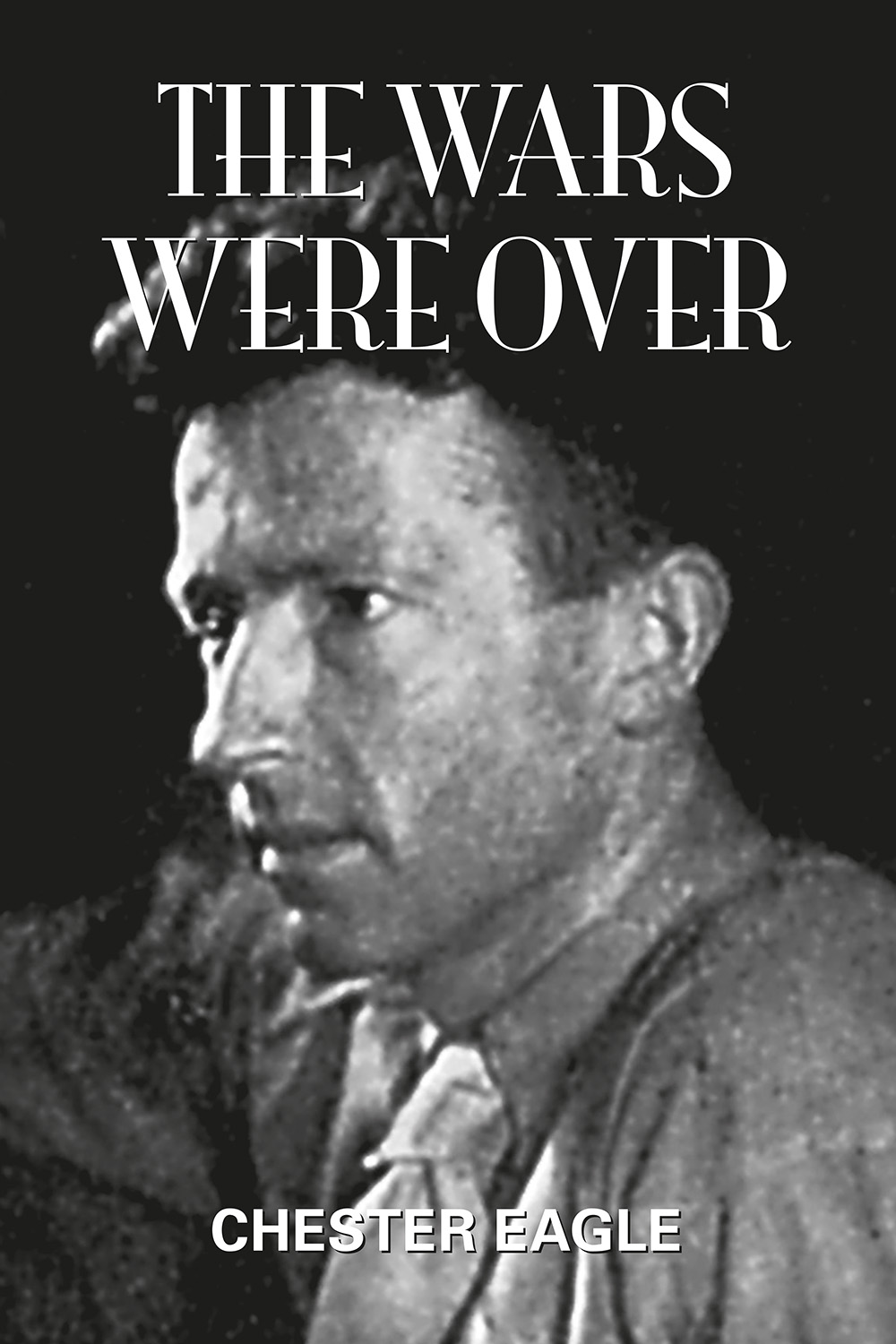
Written by Chester Eagle
Designed by Brad Webb
Layout by Brad Webb
500 copies printed by Network Creative Services
Circa 4,500 words
Electronic publication by Trojan Press (2019)
The Wars Were Over:
Max Brown was a man of his time. What time? A brief period, almost forgotten today, when people felt that they could put World War 1, the Great Depression and World War 2 (but those atomic bombs!) behind them and build a better world. Max, like all our other service men and women, collected his back pay and looked around. He settled on the Kelly outbreak in the north-east of Victoria: the famous events of 1878 – 1880. We all know them – Constable Fitzpatrick’s disastrous visit to the Kellys’ miserable undertaking on the edge of the bush; Stringybark Creek; the outlaw proclamation; Euroa; Jerilderie; the long silence; the armour making; Glenrowan; Ned’s capture and trial, with the defiant challenge to Judge Redmond Barry; his mother’s final visit; his hanging, and …
… his afterlife as a legend.
Ned’s story was both better known, and less well known than it is today. Better, because it was more immediate, in people’s minds, still being dealt with; less known, because the drama of the tale, with all its nooks and crannies, hadn’t yet been explored. The Royal Commission of 1881 had reported, but the public hadn’t absorbed the story, let alone decided what it meant.
What did it mean? Victorians – Australians – didn’t know because they hadn’t lived with it long enough. Someone had to start. It was Max Brown who got the ball rolling.
I was his friend for many years and I visited him in the Ballarat hospital where he died in 2003, I spoke at his funeral and yet, perhaps strangely, I knew almost nothing of his background, his circumstances. To know him was to be privileged, to have access to what he was thinking at the time: that, and very little else.
Let me start at the end.
In his later years, Max lived at Stockton, north of Newcastle, north of Sydney. He wrote, he got up early every morning to join a group who plunged into the Pacific, then he walked home a mile or two for breakfast. He travelled when he could. He never had much money. He never felt he needed it. Erina, his second wife, came from the Ballarat district, in Victoria, and wanted to be back there, with her people. She made arrangements, Max didn’t question them, they moved.
He hated what he found.
Erina had placed them in a retirement institution, sharing, the two of them, a tiny living space. Comfortable enough but with no room to work. Max acted. He rang one of Erina’s relatives, a man with a fast, expensive Jaguar, and said, get me out of here!
His rescuer drove him to Tullamarine airport and Max took himself back to Stockton. The home was sold, he found a room at a pub. He resumed his cold water plunges and looked around for something to write about …
Then he had a stroke. Erina took herself to Stockton, organised an air ambulance, and had him flown to Ballarat. He lay in his hospital bed, unable to speak. He chose his end. He would neither eat nor drink. He grew weak. I visited him a couple of times in those last days. He was good company. He listened, he laughed, he was curious, even as he grew weaker. The hospital looked after him. They humoured him. He died.
He was a writer of a sort we don’t see these days. Let me go back to the start.
He was born in New Zealand and came to Australia when he was eleven. I know nothing about his parents. He attended – like my own son and daughter, bless him – University High School, in Parkville, Melbourne. Then there’s another blank. He joined the RAAF in World War 2. When he was discharged he was given his accumulated wages: an admirable scheme. He researched the Kelly outbreak. He wrote Australian Son, 1948 edition. It was well received. The times were right for it. The wars, we all hoped, were over. The world could be rebuilt. A time of peace was at hand. All the positives of human life were available at last, ready to be achieved. Humanity had only to find its new directions, and start. Max was a man of this time! He spent weeks in north-east Victoria, and in Melbourne’s grand State Library, and he wrote.
The police, and those who needed them to suppress law-breakers, had always portrayed Ned and his gang as criminals; the public’s sympathies were more accepting. Thirty-two thousand people had signed a petition for mercy in the brief period between his capture and his execution. The public sensed that there was still much to be said. Max said a great deal of it in Australian Son. The Kelly outbreak was an expression of social unrest, of frustration at a system that was delivering privilege for some and poverty to others. The old English-Irish antagonism was being re-created in the huge new land of Australia. Ned’s life, his spectacular but brief career, held meanings the public, especially the under-privileged, could sense but never quite articulate.
This was what Max did for them. For us. One of the remarkable features of the Kelly story is that it has never died. It lives on. People still cling to it, find new meanings in it. This is remarkable. Ned started something, and Max, along with dozens of other writers, has carried it on.
What did Max do when he wrote Australian Son?
The only way I know to answer this question is to look at what else he wrote after that first book. There are seven books, and an eighth he never wrote. Let me list them here.
Australian Son, Georgian House, Melbourne, 1948
Wild Turkey, Georgian House, Melbourne, 1958
The Jimberi Track, Australasian Book Society, Sydney, 1966
The Black Eureka, Australasian Book Society, Sydney, 1976
Buttered Toast, Turton & Armstrong, Sydney, 1999
and posthumously:
Charmian & George, Rosenberg, Sydney, 2004
Australian Son (revised edition), NCS, Melbourne, 2005
I said there was a book he never wrote. It was an account of the life of his contemporary, the painter Sam Fullbrook (1922 – 2004). More of Sam later. There are no doubt other articles, stories and publications but the above list gives the major products of his writing life. I assume that you are familiar with either the early or the late Australian Son, and will begin my consideration of Max’s life and work with Buttered Toast (1999). I have a copy here at home signed by Max and he’s written ‘to Chester, who suggested the idea.’ I have no memory of doing so. My memories of Max at my kitchen table are of a watchful, intense man of broad sympathies who conceived humankind as a struggling, ill-organised populace likely to succeed only if they found – as they were forever unlikely to do – strong, wise, loving leadership. Max was careful with his charity because he knew how ready the world was to abuse good intentions. See The Black Eureka if you want evidence of that!
Buttered Toast is a cheeky collection. It’s Max, late in life, letting us have a look at some of the things he’s done. Perhaps the most unusual, even challenging, of these pieces is one called ‘Sisters’. It’s dated 1942, so it’s a wartime story, of Mike, who meets Doris on Bondi Beach, goes home with her, lies down with her, but is ordered to wait while she goes down to get milk for the morning. She won’t be long, she says, ‘but don’t you dare switch on the light.’ When she – it’s not Doris, we are about to find out – returns, she grabs him by the shoulders. ‘Come on, big boy!’ That’s all Mike, and readers, know till morning, when Mike sees that ‘The girl was a complete stranger. Her face was disfigured.’ She’s Susie, sister of Doris, we’re told, and ‘A hare lip doesn’t make me a cripple.’ She goes on: ‘Apparently I‘ve got something else; anyhow you’ve had a good whack at it.’ Max ends this piece in a way we don’t expect:
She added, ‘Now you can say your country did something for you before you gave it your little all.’ Thinking this over, Mike conceded that country was feminine gender, and detecting the Sydney irony he had no doubt she was Doris’s sister as claimed.
He’s been tricked, but he’s had his sexual occasion, it may be strange but how could anything be stranger than a world at war? Max is accepting of the oddity of what’s happened. There’s something very accepting about Max’s writing. You can’t deal with the world unless you can see it clearly and know it for what it is. Looking at other writers, he was scornful of some (David Malouf) and admiring of others, most of all, perhaps, Alan Marshall:
Lance Loughrey was there when Alan died, one of those who learnt most from him and loved him best. We were bitterly sorry to see him go. He died in Beaumaris but his ghost lives in the fields beyond Eltham. It is laughing, and when not running, or flying, it rides on horseback.
He describes Hal Porter, whom he visited at Shepparton, where Hal had been employed to create the town’s new library, as ‘the first of the post-war elitists’. I think we can read into this judgement a feeling that writers belong with the common people, whose feelings and aspirations they should share. Writers should contribute in some beneficial way. Compassion and understanding are meant to be active in humanity’s causes. I don’t think Max found this outlook restrictive. He wasn’t always patient with people on society’s lower rungs. In ‘The Nihilist’ he describes a man who strikes him as pretentious. He’s giving this man (whom he calls a cultural idiot) and his woman a ride to a house full of aborigines. The man has been babbling about being a nihilist: as the narrator lets them out, ‘I turned to them and said casually,’
Our revels now are ended. These our actors
As I foretold you, are all spirits and
Are melted into air, into thin air,
And like the baseless fabric of this vision,
The cloud-capp’d towers, the gorgeous palaces,
The solemn temples, the great globe itself,
Yea, all which it inherit, shall dissolve,
And, like this insubstantial pageant faded,
Leave not a wrack behind. We are such stuff
As dreams are made on, and our little life
Is rounded with a sleep.
A few pages later in this same collection he offers us an extract (not identified) from The Jimberi Track in which a white man, about whom we learn very little, quotes the opening lines of Milton’s Paradise Lost. The resonance of these lines, in the outback setting, is amazing. A page or so later, the white man is offering Ralph ten shillings to let him have sex with Connie, his wife. When Ralph brushes this off the white man doubles the offer to a pound. Ralph explains that Connie belongs to the churches of God and won’t do it, so the whitefella says he’ll have to go ‘down the street’ for the satisfaction he needs. Max moves easily between what would be extremes for most writers. If he’s aware of something, it’s not strange: it’s interesting. Another piece in Buttered Toast (‘The Moon Boat’) is about an old lady in a nursing home called Mrs Prunella Purcell. Occasionally, if helped by a glass of sherry, she reminisces about her days in Papua New Guinea, living with a matriarchal tribe.
The women chose marriage partners, arranged all marriages and the system worked to perfection. The mature menfolk lived with their wives so long as their wives would have them. There was a long-house shared by the young (in the main) unmarried men. The power of the women was largely concentrated in the hands of the matrons who ran the show by awarding sexual favours.
There is a man, known as Murdoch for heaven knows what reason, who is the tribe’s great lover. Mrs Purcell is ‘linked’ to him, but discovers, on entering his living space, rows of human heads. The inmates of her nursing home are fascinated. Prunella, propped up by three pillows and stimulated by as many sherries, offers them fragments of this strange situation. It’s very funny and Max is clearly enjoying himself, yet it’s a far cry from his earlier, politicised writing. Wild Turkey was his second book, published a decade after Australian Son. It’s an account of an American film crew making a film to be called Wild Turkey in scrub country somewhere past Broken Hill. The Americans are very American, the locale very Australian. The film makers want a bunch of aborigines to dance: local colour, you understand. The film makers have appointed Don, a stand-in for Max himself, to manage their interactions with the people and places of this country that’s so strange to them. They have no intention of changing their ways, let alone their ideas. Max’s description of the wild turkey shows his admiration for the bird, but the film makers manage to leave it out, unfilmed. There is also a sub-plot that is meant, perhaps, to be central; Don is attracted to the female film star, Dorothy, a beautiful young English woman whose heart remains captive to an earlier lover who treated her badly but isn’t forgotten. The film makers treat Dorothy with kid gloves and although she is interested in this Australian man whom she allows to be her lover on a few occasions, she realises that she has to act the part of the remote, almost untouchable star if she’s to fulfil the wishes, the ideals, of the film crew. Don – Max – sees this and has to let her go. She’s beyond his powers of redemption. This is a sad outcome but it’s only one strand of Max’s satirical treatment of the way the film crew work. The problem is Hollywood:
‘After all,’ said Don, ‘Hollywood’s not the only place films are made. Why shouldn’t both of us work in England, or put up a fight to make a few good films in Australia?’
This is the answer he gets.
‘You idealistic blokes who want to make films are all the same – you’re not interested enough in money. You don’t know how to grab …’
Then they talk about Dorothy, who’s described as being as cunning as a monkey. A little later, Don reaches his conclusion:
The trouble with making films in Australia was that all the cinemas were finally controlled from Hollywood, and with distribution tied up, Hollywood held the Australian producer in the palm of its hand.
The whole book is an expression of regret, and displeasure, at the way that Australia has come under American influence at the same time as Britain has lost its empire and ceded superiority to the United States. A little later in the book, Max goes somewhat further:
What was wrong with the world? Despite its simple cruelty, nature lived in harmony. Why was man discordant and at war with himself? Why were Australians seeking to wipe out the aborigines, and the Americans to enslave Australia? Why were businessmen and even workmates at each other’s throats? Why did men and women, blessed with all gifts for happiness, seek to humiliate and destroy each other? The old institutions were not improving – they were dying, and unless man created new ones he would be destroyed. The very idea that it might be conceivable to drop an atomic bomb on people because they didn’t have your idea was a complete denial of every boasted ideal of man.
Where did that leave Max? The above passage shows an almost universal dissatisfaction with the world as he found it. His way of dealing with this, as a younger man, was to search for good causes. He does this in The Jimberi Track, an account of the life of Ralph Mason (aboriginal name Kantja) and his wife Connie. Max follows this couple, together with the baby they have late in the book, through their various trials and troubles until, as the story ends, Ralph gives himself up to the police, ready for whatever whitefella justice is going to dish out to him. Another blackfellow, called Bonaparte, holds out hope, and Max winds things up like this:
And so Ralph Mahon, alias Kantja – or vice versa – went to work for the Government that had done its best to crucify him, in particular for that brotherhood of reformed footballers, fellmongers’ assistants, and farmers’ sons known as the W.A. Police Department; and from being regarded as a species of Tyrannosaurus rex or sabre-toothed tiger, he overnight became a cause celebre, and an example of how, under enlightened administration, a scion of that incorrigible race of lead-swingers, the Australian aborigines, could overnight be transmuted into a guardian of justice, propriety and women’s bottoms, which nevertheless continued to be pinched in public with the greatest regularity be the Mayor of Perth himself. With his warm, rugged yet handsome features inserted somewhere between a khaki fur felt and a spick-and-span drill shirt, Ralph made every inch a police tracker.
Max has a good deal more to say in this vein, but ends his interpolation with this:
At the police station, of course, Ralph and his wife lived very much as members of the sergeant’s own household; and the sergeant’s wife and daughter took the keenest interest in Connie, her well-being and dress, and the welfare of her baby, so that visitors to the town were heard to remark that perhaps something could be done with aborigines after all. But the reply to that was uncertain, for the aborigines had turned their backs on a society that gave power to the avaricious, and for once that universal lexicon, the whiteman, did not know what to say about it.
I can’t leave The Jimberi Track without observing that it must be one of the very few novels written in this country where a white writer takes on the challenge of presenting events from the viewpoint of the aboriginal people.
Ten years after The Jimberi Track the Australasian Book Society produced another of Max’s works, The Black Eureka, an account of the now-famous strike by aboriginal workers on cattle stations in the Pilbara district of Western Australia, inland from Port Hedland. Don McLeod, the central figure of this saga, his supporters and enemies, black people, station owners, politicians from Perth and a tiny handful of supporters from the Eastern states, move through its pages. Max is very close to the events, and gives a gripping account of the struggle. It’s a fascinating read, because the black people’s cause is much clearer today than it was then. We are watching as they begin to regain a little of their dignity and resist the scorn and contempt of their overlords, the squatters and the politicians. It’s worth mentioning that the Australian branch of the Communist Party supported the strikers, though it isn’t clear how close, or otherwise, Max was to them. I should also mention that one of the white supporters on hand in the west was Sam Fullbrook, though he told Max he’d stick to painting and leave politics to others. Sam is a parallel case to Max, and in his later years Max wanted very strongly to write about him as he did with George Johnston. Sam nibbled, Max pressed him, but could never get the older, later, Sam Fullbrook to give permission for Max to write about him. This is a pity, I feel, because Max would have done justice to one of this country’s more poetic but not widely appreciated painters.
Instead, Max turned his attention to another of his contemporaries, George Johnston, although the book he finally produced put the name of George’s second wife, Charmian Clift, before her husband. This was deliberate, and a judgement by Max of their relative importance. He says in the Preface to the book, which was only published a few months after his death: ‘Charmian & George is about a marriage, but it also explores and challenges the myth of greatness surrounding the late George H. Johnston, double winner of the Miles Franklin Award.’ And he goes on to say that the book is a product of ‘twenty years of research, journeys without count and the invaluable NSW pensioner travel concession’. Twenty years? Max began his researches at about the same time that Garry Kinnane, then of Ballarat, began the work which led to the publication of his book on Johnston (George Johnston: a biography, Nelson, Melbourne, 1986). Garry Kinnane’s biography, completed in reasonable time, is an excellent book; why did Max take so long?
Partly, I think, because in writing about Johnston (and in writing about Sam Fullbrook, had he been invited to do so), he was (or would have been) writing about someone of his own time and type, and therefore, in some sense and to some degree, comparing it to his own life and achievement. Buried somewhere in his view of Johnston – ‘the myth of greatness’ – was a critical consideration of himself. Another reason for the time taken to complete the book was, and again this is speculation, a dissatisfaction with his early way of approaching it as a beginning-to-end narrative. And yet the end had to be at the end because, in his view, it was climactic. Not for Max any adulation of the years on Kalymnos and Hydra, or the glamorous days in London. They were all part of a tragedy which Max could sense but needed to work out how to show. It was fairly late in those eighteen years, as I recall, that he rearranged the book into its final three parts – Homecoming; Outward Bound; and The Reckoning. The weight of the book, the urgency of its vision, is in the last of the three. I must point also to a few lines early in the Outward Bound section, where Max says (page 67): ‘The Herald meanwhile commenced to publish High Valley in instalments. George had never been so proud of Charmian. The pair were a success. They were also happy, and if happiness can be measured, they were never to be so happy again.’ This statement, made as a chapter concludes, may only be noticed in passing by the reader, but it is the key, and the challenge to the biographer, which characterises the rest of the book.
Max’s Johnston book was a very different task from his early work on Kelly. Ned was public property. Nobody owned him, everybody owned him. You had to talk about him, write about him, in that way. The Johnston story was different. What happened to them were things they did to themselves. The Kelly outbreak was social. Remember the arrest of sympathisers with the Kelly cause, and their months in jail? Bear in mind also the likelihood of widespread support, had the gang been able to bring off the coup they’d planned for Glenrowan. The Johnston story was never like this. It was about two people – or was it only one? – who thought they could make life go the way they wanted it to. For years, it seemed, they did. Hence that third section heading – The Reckoning. Charmian and George are famous, and widely envied, for their years in Greece, for their boldness in leaving London for the challenges and the rewards of island life. Max didn’t believe any of this. It seemed obvious to him that they’d have to pay for their ‘freedom’, and they did. Hence, again, the weight of the third and final part.
Something else that needs to be said is his view of the balance between man and woman in the Johnston marriage. Max takes it for granted that the reader knows about the public’s reception of George’s My Brother Jack. He says little about the book beyond its sales, and fame. He analyses Clean Straw For Nothing sharply, however, treating it as the work of a writer allocating blame. He emphasises the unwillingness of Charmian to read it. She can’t, and won’t. He takes her side. He has, as he makes clear late in the book, a very high estimation of Charmian’s character and abilities:
… it was Charmian’s magnificent receptivity to life that made her so attractive. First of all she had this strong sexual appeal which she radiated and encouraged. But she was Simone de Beauvoir too; she had structure, she had a knowledge wide and firmly based which enabled her to relate ordinary things to great things. Like all women writers (… ) she was warm, and warm in her appreciation of people; she was the peer of all men and all women without claiming to be a feminist. But there was more to it. She was frightened of no-one and the enemy of no-one; she was a public woman like a public house, with food and drink, laughter, music and a fire burning. Her confidence and vision were contagious and swept all before her. She had written one memorable book unappreciated, Mermaid Singing. What would she not have become had George died as expected? She would have gone on to become a great writer, uniting everything from within, and Australia, which was trying to find its feet only to be dragged back at every turn, might never discover the tragedy of its loss.
Not many men can or will write as boldly as this about a woman. When I look at the passage I see the man I knew – direct, open, with sympathies wide but sharply directed. That receptivity to life that he perceives in Charmian was a part of himself. And he was generous too. Earlier in this summation of a writer I referred to his belief – principle, perhaps – that writers belong with the common people. It’s significant that he returned to Ned Kelly in later life. He needed to. Ned hadn’t changed but Max had seen that there was more to say. He was like that. I recall reading the manuscript of the Johnston book he was going to send to Rosenberg Publishing. When the book came out, a few months after his death, I found a last minute change on the very last page. He’d added a paragraph about a bell tolling on Hydra:
… it’s not sounded every day, but only to speak forth when a human soul passes, or a citizen’s remains are returned to the home island for prayers and burial. It is our prayer that this bell might toll for Martin and Shane, and for their parents also – one much-loved nicknamed ‘The Hat’ and the other whom our native establishment esteems so highly and Greeks call ‘The Skinny Australian.’
Max is buried in Ballarat cemetery. If you’re there, or passing through, spare him a thought.
The writing of this book:
